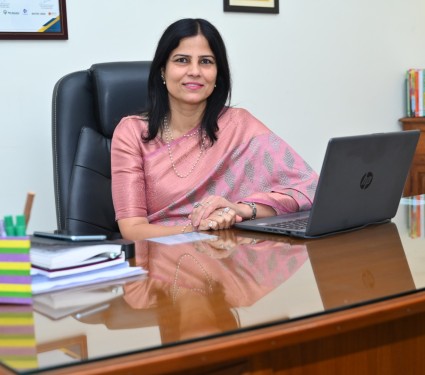Dharav High School, Jaipur: Nurturing a Culture of Care
– Seema Sehajpal, Principal, Dharav High School, Jaipur
As the principal of Dharav High School, I am committed to fostering an environment where every member of our community feels safe, valued, and cared for. Nurturing a culture of care in our school is not just a goal; it’s a fundamental mission.
Why a Culture of Care Matters?
A culture of care is the foundation upon which successful learning, personal growth, and overall well-being are built. When students and educators feel supported, respected, and safe within the school’s walls, incredible things can happen. Students are more likely to engage in learning, taking risks, and developing the skills required to thrive in a complex and rapidly changing world.
 Moreover, a culture of care extends beyond the classroom. It empowers students to become empathetic and compassionate citizens, instilling values that they will carry with them throughout their lives. In essence, it is our shared responsibility to cultivate this culture, and I firmly believe that we are up to the task.
Moreover, a culture of care extends beyond the classroom. It empowers students to become empathetic and compassionate citizens, instilling values that they will carry with them throughout their lives. In essence, it is our shared responsibility to cultivate this culture, and I firmly believe that we are up to the task.
Strategies to Build a Culture of Care
Open Lines of Communication: To nurture a culture of care, we must encourage open, respectful, and honest communication among all members of our school community. We are actively working to create spaces and opportunities for students, parents, and staff to share their thoughts, concerns, and ideas.
Mental Health and Well-being: At Dharav High School, we recognise the importance of mental health and well-being. Our school is committed to providing the necessary resources, such as counseling services and workshops, to support students and staff in times of need. We are continually exploring ways to reduce stress and promote resilience in our educational environment.
Anti-Bullying Initiatives: Bullying is antithetical to a culture of care. We have zero tolerance for bullying and are implementing anti-bullying programmes that teach kindness, empathy, and the importance of standing up for one another.
Inclusive Practices: Every student deserves an equitable and inclusive education. Our faculty is trained to differentiate instruction, ensuring that all students, regardless of their abilities, backgrounds, or learning styles, have an opportunity to excel.
Community Involvement: We are actively reaching out to parents, community organisations, and local businesses to create a support network for our school. This collaborative approach will help ensure our students receive the holistic care they need to succeed.
Lead by Example: As the school’s leadership, we understand the importance of modelling the behaviour we wish to see. We commit to treating everyone with kindness, respect, and empathy, and we encourage all members of the school community to do the same.
In conclusion, building and sustaining a culture of care is a journey, and it’s one that we are committed to as a school community. Together, we can create a nurturing environment in which all of our students can thrive.
Also read:
Eduleader Speaks: Aditi Misra, Founder Principal of DPS, Sector-45, Gurgaon
















Add comment